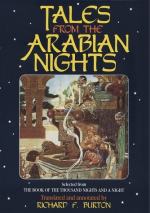the young Prince of the Black Islands, the envious
Weezer and the Ghoolah, and the stories of the Porter
and the Ladies of Baghdad lose nothing of their charm
in the new, and, we may add, extremely unsophisticated
version. For Captain Burton’s work is not
virginibus puerisque, and, while disclaiming for his
version anything like intentional indecorum, he warns
the readers that they will be guilty of a breach of
good faith should they permit a work prepared only
for students to fall into the hands of boys and girls.
From the first to almost the penultimate edition of
these stories the drawing-room alone has been consulted.
Even Mr. Payne, though his otherwise faithful version
was printed for the Villon Society, had the fear of
Mrs. Grundy before his eyes. Moreover, no previous
editor—not even Lane himself—had
a tithe of Captain Burton’s acquaintance with
the manners and customs of the Moslem East. Hence
not unfrequently, they made ludicrous blunders and
in no instance did they supply anything like the explanatory
notes which have added so greatly to the value of
this issue of “Alf Laylah wa Laylah.”
Some of these are startling in their realism, and
often the traveller who believed that he knew something
of the East, winces at the plainness with which the
Wazir’s daughter tells her tales to Shahryar,
King of the Banu Sasan. The language is, however,
more frequently coarse than loose, and smacks more
of the childish plainness with which high and low
talk in the family circles from Tangier to Malayia,
than of prurience or suggestiveness. The Oriental
cannot understand that it is improper to refer in
straightforward terms to anything which Allah has created
or of which the Koran treats. But in his conversation,
as in his folk-lore, there is no subtle corruption
or covert licentiousness—none of the vicious
suggestion and false sentiment that pervade so many
of the productions of the modern romantic school.
It is, indeed, questionable whether there is much
in these inimitable romances half so objectionable
as many of the chapters in Rabelais and Boccaccio.
Nor do the most archaic of the passages which Captain
Burton declines to “veil in the decent obscurity
of a learned language” leave much room for the
admirers of Shakespeare, or Greene, or Nash, or Wycherley,
or Swift, or Sterne to cry shame. Their coarseness
was a reflection of the times. The indelicacy
was not offensive to those who heard it. On the
other hand, apart from the language, the general tone
of “The Nights” is exceptionally high and
pure. The devotional fervour, as Captain Burton
justly claims, often rises to the boiling-point of
fanaticism and the pathos is sweet and deep, genuine
and tender, simple and true. Its life—strong,
splendid, and multitudinous—is everywhere
flavoured with that unaffected pessimism and constitutional
melancholy which strike deepest root under the brightest
skies. The Kazi administers poetical justice
with exemplary impartiality, and so healthy is the




